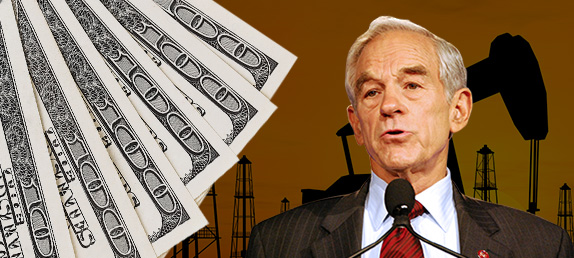
Former presidential candidate Ron Paul has always been outspoken on economic issues and lately he has been issuing some dire warnings. In an interview with CNBC, Ron Paul has said that “the United States is on the brink of a catastrophic financial crisis” due in large part to an extremely overvalued U.S. dollar.
Even with the stock market growing and the dollar gaining strength, Ron Paul only sees the inevitable bursting bubble. He feels that the world is “awash in easy money” and that all the economic stimulus is doing is pushing out the timeline of disaster.
“It’s not so much that the dollar is a great currency. It’s the fact that nothing else is any better,” Paul said in the interview. “The fundamentals are a disaster. The economy is in bad shape when you have more than half the people hardly making ends meet.”
Even though Paul seems confident in his prediction, he is not entirely sure when it could happen. He does feel, however, that it will be “quick and unexpected.” “Most of the time, these things are unforeseen,” he said. “Did anybody warn us about 2007, 2008 in Lehman Brothers? Nobody warned us about that.”
According to Paul, the catalyst for dollar’s downfall and potential stock market crash will most likely be when the Federal Reserve begins to raise interest rates later this year. Paul blames the Fed’s quantitative easing plan for falsely inflating the economy by pumping it full of new money instead of allowing for actual economic growth to create the recovery. So when the Fed decides to raise rates the economy will not really be strong enough to survive the ensuing pressure.
“Right now, the markets have tried to correct things since ’08 and ’09 but the correction has been prohibited,” said Paul. “It’s just like in the Depression; we prohibited, we delayed the inevitable.”
The recent oil crisis could be a sign that Mr. Paul may be on to something. As oil prices have dropped, oil rich nations have had to start using their own savings to cover expenses. According to Bloomberg, this could lead to potential global economic disaster since this is money that has historically been recycled back into circulation.
The Bloomberg report points out that “if oil and other commodity prices remain depressed, the trend will cut demand for everything from European government debt to U.S. real estate as producing nations seek to fill holes in their domestic budgets.”
“This is the first time in 20 years that OPEC nations will be sucking liquidity out of the market rather than adding to it through investments,” David Spegel, head of emerging markets sovereign credit research at BNP Paribas SA in London, told Bloomberg.
With this loss of liquidity and foreign investments, a move by the Federal Reserve to raise interests could very well make Ron Paul’s dollar bubble prediction come true. An artificially inflated dollar would have a hard time withstanding this potential perfect storm of economic chaos, leading to burst bubble.
Investments not tied to the dollar, like gold, could end up being a safe-haven for investors wanting to protect themselves. Historically, as the U.S. dollar has declined in value, gold has gone up and vice versa. Most analysts, including Jim Cramer, advise having physical gold make up a portion of an investment portfolio as “portfolio insurance”.
